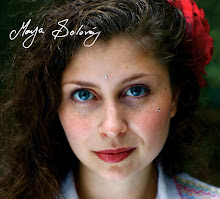As I said before, English tends to be good for describing things, for nuance, for multiple meanings, puns, plays on words. It is also about what is not said.
I mentioned in my last post that as my musical knowledge grew, I became more interested in the purely musical aspect of songs, rather than the lyrics. I have since come back full circle from that one a bit, and while I can indulge that motive while writing in Spanish or Portuguese, I have come to realize the beauty and elusive skill that it takes to write good lyrics in English. Firstly, the 'stuff' of life is always in the drama. Drama always happens in conflict, which can happen within one person, but usually happens between two people. A lot of that drama is dialogue and action. (And yes, sometimes, lack thereof). Since I began to incorporate these elements into my lyrics, a whole new world opened up for me. Before then, I wrote a lot of feelings with a lot of imagery. But who cares about those things, besides the person feeling them? Feelings are perishable. They are reactions of actions. On their own, they are superfluous, flowery emotional
splooges that mean nothing. But within the structure of action and dialogue, they can add subtlety, color, mood, analogies, and more detail.
If I rant on in a song about
how I feel about you, what do I not give you a chance to do? I do not give you a chance to speak!
This is a very undemocratic process.
These are the first two songs to which I came to these profound lyrical observations.
To listen, paste the link- http://www.myspace.com/mayasolovey
DREAMGIRLSYou say, "I can be loyal, but not faithful"
I say "Fine, but I will return the favor"
"Our love is just too big for two people"
"Fine. Go after that dream you've been seeking."
Its the
dreamgirls that you like best
The ones that never let you rest
You run and run, but you don't find
They live only inside your mind.
I've been alone in far away places
But the loneliest I've been is with you
We are strangers to each other
Living with ghosts
And shadows of our lover
I try to leave, but I just can't go
These chains I carry them alone
It breaks my heart to
Love you
But what else can I do.
You say I choose to feel this way
I say "who would choose this"
You hold on to your dreams
Longer than you do people
It's the
dreamgirls that you like best
The ones that never let you rest
You run and run, but you don't find
They live only inside your mind
I try to leave, but I just can't go
These chains I carry them alone
It breaks my heart to
Be with you
But what else can I do.
It breaks my heart to
Love you
But what else can I do.
©2008 Maya
SolovéyHEARTACHE BLUES
I will
Put a song on the phonograph
Stay a while, we’ll have a laugh
And drink a glass of wine or two
You’ll take a step on through the door
Say, “I wish I’d call you more”
I smile and say,
“Then baby, why don’t you”
Don’t play it like a fool
You know just what you do
You’re playing heartache blues.
You say,
“Hope you don’t think I’
ve been cold
Baby you look so beautiful
I missed you so much, I forgot”
Funny, I did not miss you at all
Never thought about when you’d call
I never bought
The cologne that you wear
No baby, I don’t care
Just like I do not breathe air
There are my heartache blues.
So baby why don’t you
Just let me think it’s true
Cause if I can’t have you
Then play me like a fool
We’ll both know what we do
Heartache Blues.
©2008 Maya
Solovéy











